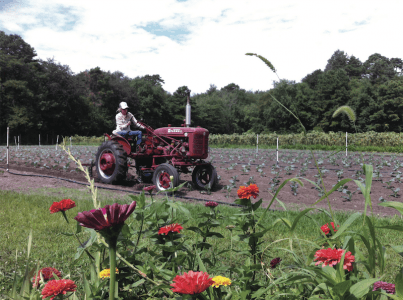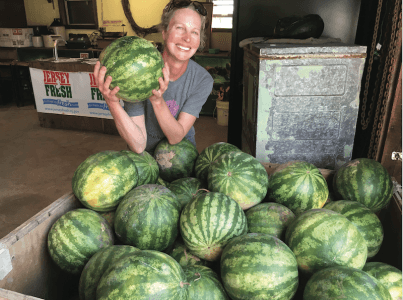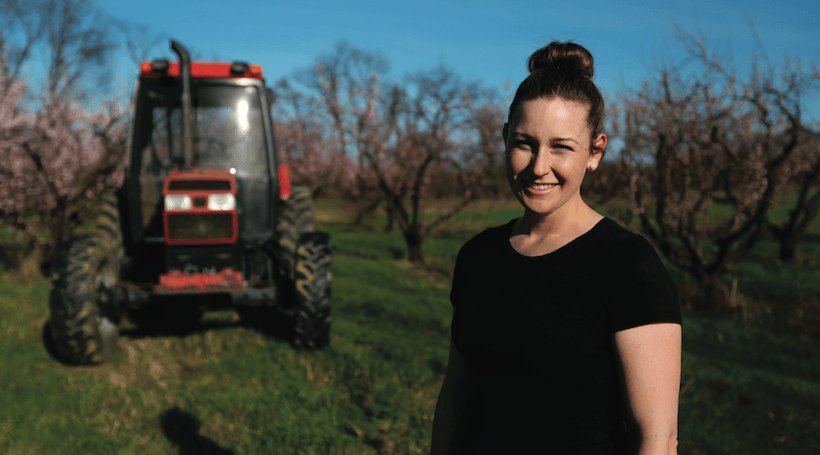Head Photo by Margo Reed
When a driver delivering lime to Robson’s Farm in Wrightstown had his truck break down, he called the farmer to say he’d be late. That farmer laughs whenever she talks about what happened next.
“My number was on his paperwork,” Rose Robson says. “When I answered the phone, he said, ‘You’re listed as the contact, but should I be talking to your husband?’ I told him, ‘Yeah… I don’t have one of those.’ I think he felt really bad.”
Robson, 30, is the owner and operator of her 40-acre Burlington County farm, and one of a growing number of young female famers in South Jersey. She says people often assume she’s a farmer’s wife. She’s not, though she is a farmer’s daughter. And granddaughter.
“I’m a fourth-generation farmer, but for a long time I didn’t plan to join the family business,” Robson says. “I grew up on a 1,200-acre farm, and of course I loved it, but I never thought I’d actually come back and be a farmer.”
Robson went off to college and began a career in medical equipment sales, but six years later, unexpected events brought her home.
“I’m an only child,” she says. “When I was a sophomore in college, my dad and grandfather both passed away, and it changed things for me. After they were gone, we put the big farm up for sale. I remember suddenly panicking. I told my grandma, ‘You have to stop the sale of one side of the farm. I want it.’”

Jennifer LaMonaca owns and operates a 1.5-acre farm in Egg Harbor City.
The sale went through, but Robson found out her mother had kept 40 acres just down the road. Robson spent a year working for two other farmers, learning the ropes, and in 2013 officially became the owner of her own farm.
Today she runs a popular farm stand and community-supported agriculture (CSA) program, and grows mixed vegetables, cut flowers and orchard fruit like peaches, apples, quince and pawpaw.
Just under 20 percent of New Jersey’s farmers are women, according to U.S. Department of Agriculture (USDA) statistics. Jenny Carleo, county agent for the Rutgers New Jersey Agricultural Experiment Station in Cape May County, thinks the real number is higher.
“Sometimes women who are famers don’t consider themselves farmers,” Carleo says. “They’ll say, ‘I’m just a farm wife,’ and they’ll neglect to tell you they run the tractors, they plant the seeds, they do the paperwork. They think of their husband as the farmer, and when the USDA runs its census it asks for one principal operator. So I believe the data is way off.”
In 2011, Carleo worked alongside Robin Brumfield, a professor and specialist in farm management at Rutgers-New Brunswick, to bring a Midwestern program called Annie’s Project to New Jersey. Rutgers invited women to attend classes on the less visible aspects of farm life.
“A lot of times women on the farm are the ones doing the paperwork,” Carleo says. “They handle payroll, insurance, taxes and risk management. Annie’s Project is teaching them how to be more effective partners in the business by improving those skills.”
Brumfield says the goal is for participants to leave the course with a business plan.
“They come one night a week for six weeks,” she says. “We’ve found some people even come back again because there’s so much information they can’t catch it all the first time.”
Brumfield says women are vital to successful farm management – and that’s not a 21st-century concept.
“When I first came here 30 years ago, there was an old guy who came in every day,” she says. “He was way older than me, and his PhD thesis was on what causes farms to fail. The No. 1 reason way back then, probably in the ’50s, was the woman died. They’re generally the one holding that farm together.”
Carleo says Annie’s Project has been tailored over the past five years to suit an audience of women who don’t necessarily fit the mold of farm bookkeeper.
“In New Jersey we find there are many different kinds of women getting involved in agriculture,” she says. “Some of them are the main farmer, and they might not have a husband, or they might have a wife. It’s not that 1950s farm model that might still exist in other places.”
The biggest benefit Annie’s Project provides is a chance to be surrounded exclusively by female classmates.
“Women can benefit from having things focused on them,” Carleo says. “It increases their willingness to communicate with each other and with the presenter. They feel safe to express certain things or ask questions about things. It totally changes the dynamic of the group and of the educational program.”
Jennifer LaMonaca attended Annie’s Project in 2011, soon after starting her own farm and CSA program on 1.5 acres in Egg Harbor City.
“I was relatively new to farming, and Annie’s Project created a less intimidating environment for me to be around other farmers,” she says. “It was a comfortable place for me to ask questions and not be embarrassed.”
LaMonaca’s small operation is in line with a new agricultural trend Brumfield sees developing in the state. It’s one she says is largely driven by women.
“More women seem to be interested in using more organic growing practices,” Brumfield says. “There’s not much interest in running a 1,000-acre farm.”
From her office at the Rutgers Cooperative Extension in Cape May County, Carleo runs programming for this new generation of farmers. The classes, called Ultra Niche Crops for the Progressive New Farmer, are funded with a grant from the USDA. Last year, more than half of the attendees were women.
But even after learning the basics of farming and business operations, Carleo says it can be difficult for a prospective female farmer to get her foot in the door.
“One of the big challenges is getting someone to employ you without the background or experience,” Carleo says.
“There’s an assumption that you can’t do the work. When someone sees a guy wanting to work on a farm, they automatically assume he’s capable of doing what’s required. When I was a kid and I wanted to work on a farm, I applied and said I wanted to do field work. They said, ‘There’s no way we’re going to hire a 16-year-old girl to work in the field.’ I do still see an underestimation of women’s abilities. Physical strength isn’t the only thing you need to be a farmer. You need emotional strength too.”

Jennifer LaMonaca owns and operates a 1.5-acre farm in Egg Harbor City.
LaMonaca knows all about physical jobs, and she’s no stranger to working in a man’s world. She began her career in marine science, working for U.S. Fish and Wildlife Service, the N.J. Department of Environmental Protection and Rutgers.
“I spent a year working on the Chesapeake Bay for the Smithsonian on blue crab restoration,” she says. “My days were spent on the bay hauling nets full of fish. I worked on boats and out in the mud. When I wasn’t in the field I was in the lab, working up data and writing papers for peer-review journals.”
In 2010, she moved her ambitions to dry land, renting fields from her husband’s uncle, the owner of B&B Farms in Egg Harbor City and a retired N.J. Secretary of Agriculture.
“Our family was skeptical,” LaMonaca says. “I really had to prove myself – I’d never even driven a tractor. I started at the bottom and worked my way up. I needed to show I was capable. Four years into farming, I finally bought my own tractor. There were walls to break down, for sure. It is a male-dominated community, so it takes courage to step forward and say, ‘Hey, I’m doing the same job you are, let’s be on a level playing field.’”
Robson’s experience with her lime deliveryman comes as no surprise to LaMonaca. She’s used to people assuming her husband is the farmer in the family.
“I’m the owner and operator of the farm,” she says. “My husband has his own business; he’s a graphic designer. But if he’s on the farm and a delivery truck comes, they’ll look for the man, even though I’m standing there with the checkbook. If he takes a ride with me to a supply store or we go look at a piece of equipment, the salespeople will talk to my husband, who doesn’t even know what we’re looking for. They ask him questions. I’m the one answering, and they’re still talking to him.”
LaMonaca’s not offended by it; she knows the more she talks tractors, the more she’s changing the perception of women farmers.
“I’m comfortable in that role,” she says. “From my experience working with commercial fishermen, I know that when they get to know me and see that I know what I’m doing, they respect me. It just takes a little time.”
Robson’s aware there are still hurdles for women in agriculture, but she thinks female farmers may also have some advantages.
“There are so many things out of your control in farming,” she says. “You have to learn to adjust, because nothing is guaranteed. When something goes wrong, you get creative and figure out what to do with the problem. I think women are really great at that. I think we enjoy that creative challenge.”
This new brand of agriculturalist may be a departure from the traditional macho farmer role, but Brumfield says the two generations have more in common than you might think.
“Farming is hard work,” she says. “You put in long hours, and you don’t make a lot of money. It has to be a passion. I think these young women have that same mindset as some of the old guys. It’s a lifestyle, and they’re living it for the same reasons. ”














